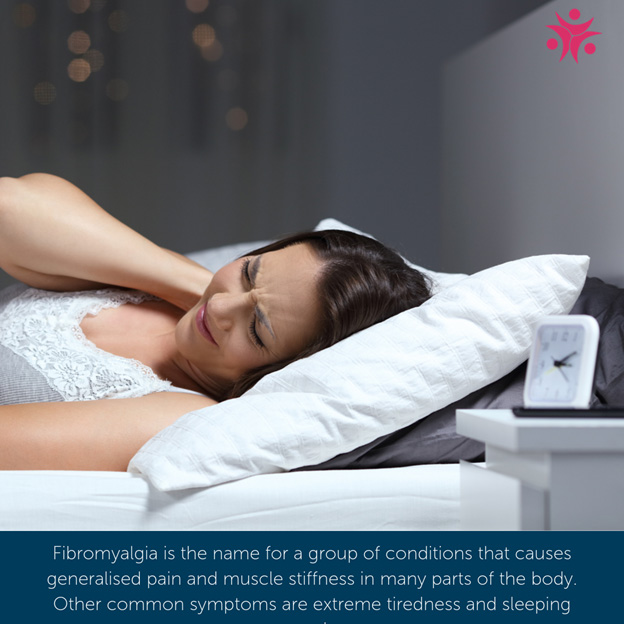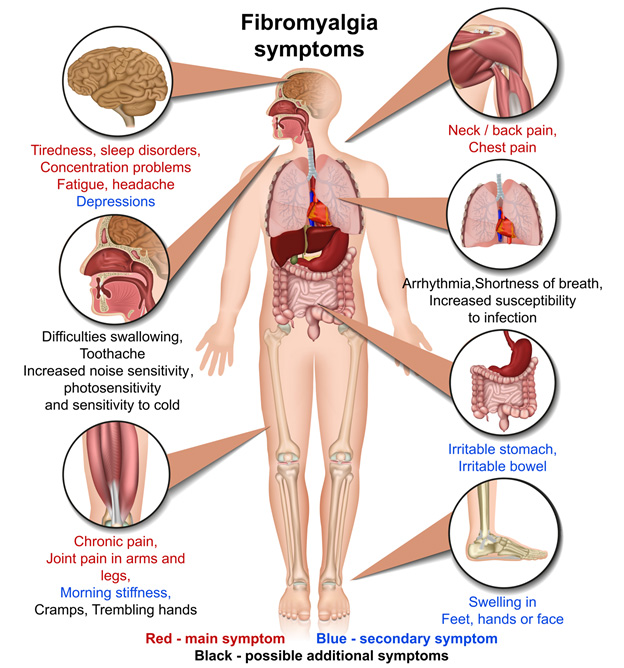
Does Fibromyalgia Cause Sleep Problems
Tuesday, May 26, 2020
One of the most common symptoms of fibromyalgia is poor sleep. Fibromyalgia is a spinal cord condition that causes pain and fatigue while also often affecting concentration and overall quality of life.

Sleep problems have reportedly become more and more of an issue for people with fibromyalgia and treating these sleep issues can, in turn, help with daytime fibromyalgia symptoms.
Here, we'll go over what fibromyalgia is, how sleep and fibromyalgia are related, and treatment options for pain and fatigue associated with fibromyalgia.
What is fibromyalgia?
As we mentioned, fibromyalgia is a chronic disorder affecting the central nervous system producing symptoms including:
- Fatigue
- Muscle tenderness
- Cognitive issues including memory loss
- Trouble sleeping
- Muscle twitching or cramping due to fatigue
- Headaches
- Irritable bowel syndrome
- Painful menstruation
- Numbness or tingling hands and feet
- Sensitivity to external temperature
- Noise and bright light sensitivity
- Mood swings, irritability, depression, or anxiety
In the past, people who sought assistance for their condition were told it's “all in their head” but these days, doctors diagnose fibromyalgia often. It affects millions of people; especially middle-aged women and the condition is very much real. Still, it's an incredibly complicated disorder that isn't fully understood.
“Fibromyalgia is affects around 2-5% of the Australian population, mainly young to middle-aged women.”
Essentially, people with fibromyalgia seem to process pain differently than those without the condition. It could be a deficiency in pleasure neurotransmitters, making pain seem more intense. Genetics may also play a role meaning fibromyalgia might run in families. Still, the exact cause is unknown.
As for risk factors, those who are overweight or obese, smoke, have rheumatoid arthritis or ankylosing spondylitis, have a relative with fibromyalgia, or have experienced a traumatic spinal cord injury have a higher chance of developing fibromyalgia.
Certain trigger events could cause fibromyalgia to flare up including:
- Hormonal changes during a menstrual cycle or pregnancy
- Chronic stress
- Weather changes
Symptoms Of Fibromyalgia

The Link Between Sleep and Fibromyalgia
Fibromyalgia is a chronic condition affecting the spinal cord which means it's an issue associated with the central nervous system. A study from University Hospital in Italy found those with fibromyalgia had increased EEG alpha activity during non-REM sleep, more arousal, and a more frequent occurrence of cyclic alternating pattern.
You can find that research paper by visiting https://www.omicsonline.org/open-access/sleep-disorders-in-fibromyalgia-syndrome-2167-0846-1000232.php?aid=69642
There is some sort of connection although a clear diagnosis of fibromyalgia-related sleep problems has not been proven outright.
It's largely unclear whether fibromyalgia is the cause or the effect of poor non-restorative sleep. Is the lack of sleep contributing to the widespread pain associated with fibromyalgia? Or is the central nervous system being affected by fibromyalgia and affecting people's sleep?
The real question is, how can we go about treating fibromyalgia to reduce pain?
Treatment of Fibromyalgia
Unfortunately, there's not a cure for fibromyalgia but there are things you can do to alleviate some of its symptoms to improve your day-to-day life.
Taking a proactive approach to improving your fibromyalgia symptoms can do wonders for your well-being with self-care tactics such as improving sleep, reducing stress, and staying active.
First, and to bring everything full-circle, one of the best treatments of fibromyalgia is to work on improving your sleep. When you develop fibromyalgia, your sleep is sure to take a hit as well, so it's smart to start by improving your sleep patterns.
To improve your sleep and, in turn, improve your fibromyalgia symptoms, try these tips:
- Establish a consistent sleep schedule of going to bed and waking up at the same time every day (even on the weekends)
- Reduce caffeine intake
- Incorporate relaxation techniques before bed
Next, since stress can severely exacerbate the symptoms of fibromyalgia, learning to manage stress is also important. Breathing exercises, time management skills, and coping mechanisms for life's ups and downs will be essential to dealing with fibromyalgia.
Finally, stay physically active. Although you may feel reluctant to engage in exercise when you're in pain and discomfort, studies have shown that regular exercise, especially aerobic exercise, has huge benefits.
Not only does exercise release endorphins to boost your spirits, but it can also increase your endurance and decrease your pain. However, it's important to start at the fitness level that's right for you.
Check out our other blog on the what the difference between rheumatoid arthritis and fibromyalgia is HERE
One of our expert physiotherapists can create a specialised exercise program just for you to help manage your fibromyalgia. Book an appointment at one of our convenient locations throughout Australia or let us come to you with our mobile physio services. Call us today on 1300 731 733 or Book Online for one of our home visit and mobile services. We are Australia wide now.
See some of our mobile & home physiotherapy locations below
Sydney
Western Sydney
Northern Beaches
Wollongong
Melbourne
Adelaide
Canberra
Brisbane
Live a life with less limits.
